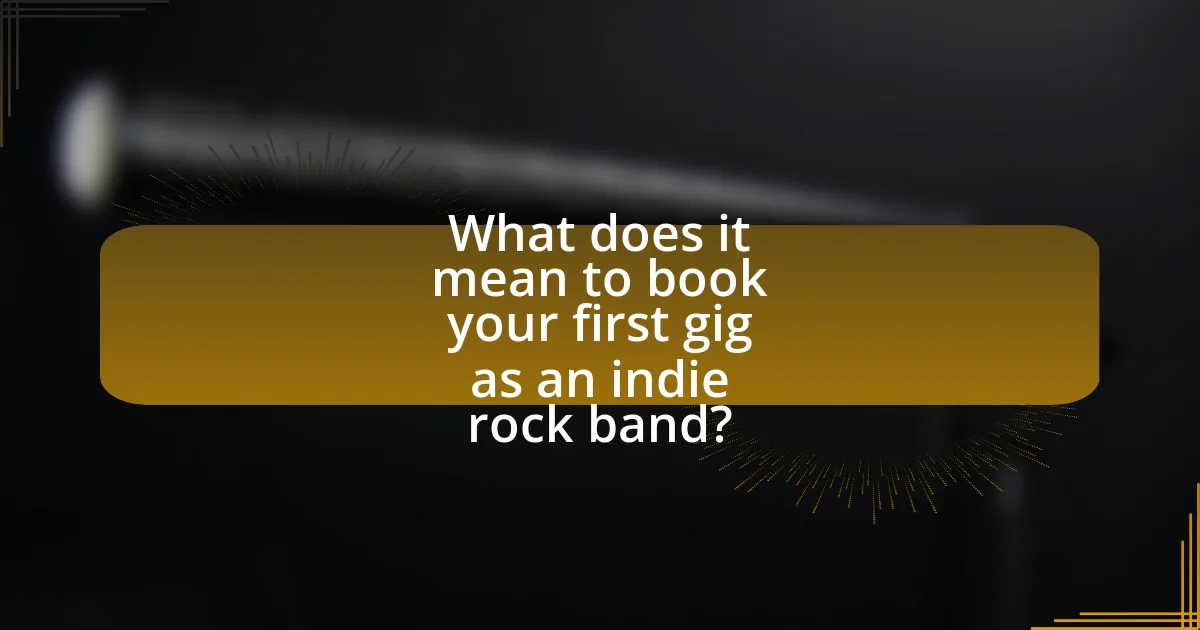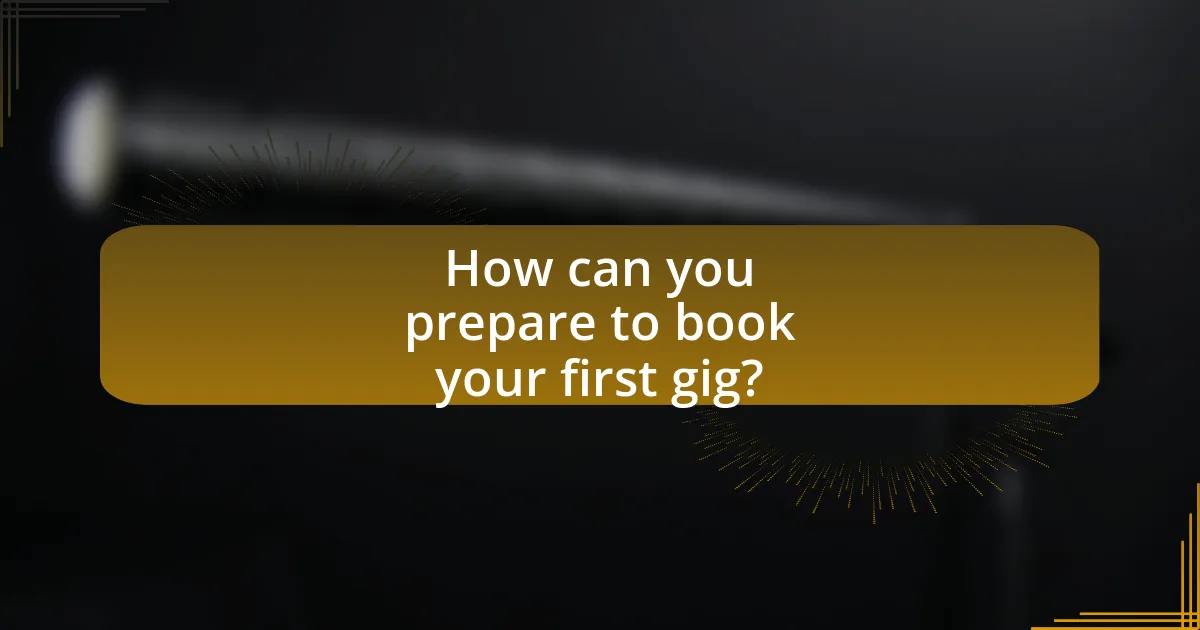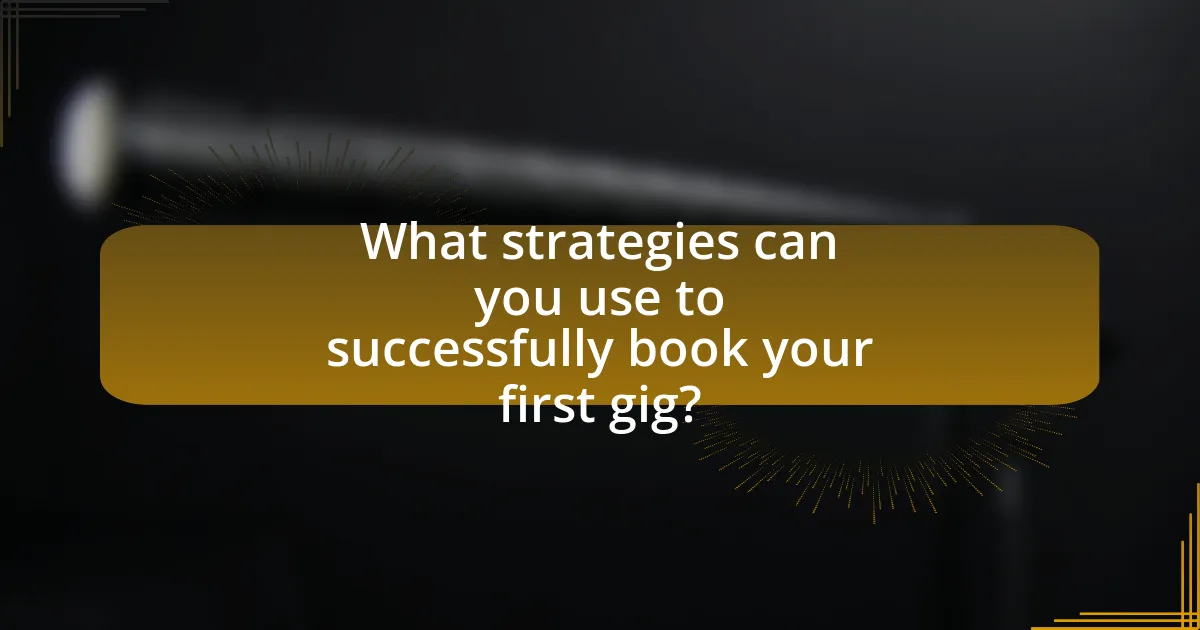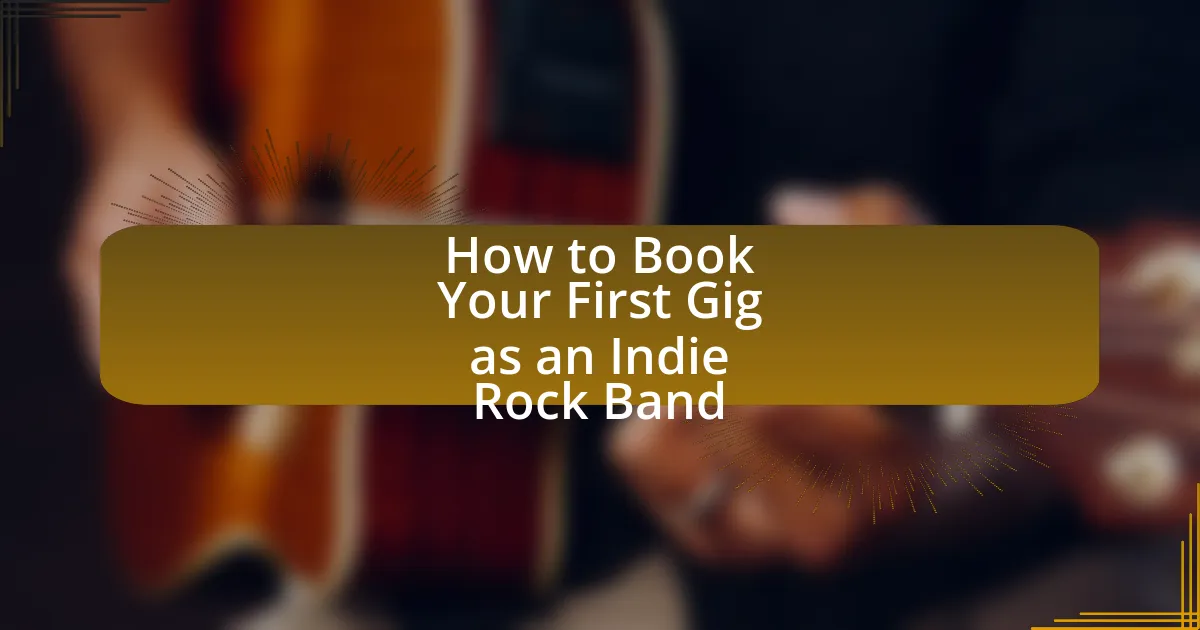Booking your first gig as an indie rock band is a pivotal step in establishing a presence in the music scene. This process involves securing a live performance opportunity, negotiating terms with venue owners, and promoting the event effectively. The article outlines the importance of this milestone, detailing how it can enhance visibility, build a fanbase, and provide valuable performance experience. It also addresses common challenges faced by emerging bands, such as securing venues and navigating logistical issues, while offering practical tips for preparation, networking, and promotion to ensure a successful debut performance.

What does it mean to book your first gig as an indie rock band?
Booking your first gig as an indie rock band means securing a live performance opportunity at a venue, which is a significant milestone in establishing the band’s presence in the music scene. This act typically involves reaching out to venue owners or promoters, negotiating terms such as payment and performance duration, and confirming the date and logistics of the event. Successfully booking a gig can lead to increased visibility, potential fan engagement, and the chance to showcase original music to a live audience, which is crucial for building a career in the music industry.
Why is booking your first gig important for an indie rock band?
Booking your first gig is crucial for an indie rock band because it establishes their presence in the music scene and provides an opportunity to connect with an audience. This initial performance serves as a platform for the band to showcase their music, gain exposure, and build a fan base. According to a study by the Music Industry Research Association, live performances are a primary revenue source for independent artists, highlighting the importance of early gigs in generating income and fostering growth. Additionally, performing live helps bands refine their stage presence and performance skills, which are essential for future success.
What impact does a first gig have on a band’s career?
A first gig significantly impacts a band’s career by establishing their presence in the music scene and providing initial exposure to potential fans. This performance serves as a critical milestone, allowing the band to showcase their talent, connect with an audience, and gain valuable performance experience. According to a study by the University of Southern California, live performances are essential for building a fan base, as 70% of concertgoers report discovering new music through live shows. Additionally, a successful first gig can lead to opportunities for future bookings, media coverage, and networking within the industry, all of which are vital for a band’s growth and sustainability.
How can a first gig help build a fanbase?
A first gig can help build a fanbase by providing an opportunity for direct engagement with an audience. When a band performs live, they create a memorable experience that can resonate with attendees, leading to increased interest and loyalty. According to a study by the National Endowment for the Arts, live music events significantly enhance audience connection, with 70% of attendees reporting a desire to follow artists after experiencing their performance. This initial interaction can lead to social media follows, merchandise sales, and word-of-mouth promotion, all of which are crucial for expanding a fanbase.
What are the common challenges faced when booking a first gig?
Common challenges faced when booking a first gig include securing a venue, establishing a performance fee, and promoting the event effectively. Securing a venue can be difficult due to competition and availability, as many venues prioritize established acts over newcomers. Establishing a performance fee is challenging because new bands often lack a track record to justify higher fees, leading to potential undervaluation of their work. Additionally, promoting the event effectively is crucial; new bands may struggle with limited marketing experience and resources, making it hard to attract an audience. These challenges are frequently reported by emerging artists in the music industry, highlighting the complexities of entering the live performance scene.
How can lack of experience affect the booking process?
Lack of experience can significantly hinder the booking process for an indie rock band by leading to ineffective communication and negotiation with venues. Inexperienced bands may struggle to present themselves professionally, which can result in missed opportunities or unfavorable terms. For instance, a study by the Music Industry Research Association found that bands with prior booking experience secured better deals and more favorable performance slots compared to those without. This indicates that experience not only enhances negotiation skills but also builds credibility, making it easier to establish relationships with venue owners and promoters.
What logistical issues should bands consider?
Bands should consider several logistical issues when booking their first gig, including transportation, equipment setup, and scheduling. Transportation involves planning how to get to the venue, which may require a reliable vehicle and consideration of travel time. Equipment setup requires ensuring that all necessary instruments and sound gear are available and functional, as well as understanding the venue’s technical requirements. Scheduling is crucial, as bands must coordinate with the venue for load-in times, sound checks, and performance slots to avoid conflicts. These logistical elements are essential for a smooth performance and can significantly impact the overall success of the gig.

How can you prepare to book your first gig?
To prepare to book your first gig, start by creating a professional press kit that includes your band’s biography, high-quality photos, and a demo of your music. This press kit serves as a crucial tool for promoters and venue owners to assess your band’s potential. Additionally, research local venues that host indie rock bands and understand their booking process, which often includes submitting your press kit and possibly a performance history. Networking with other local bands can also provide insights and recommendations for venues, as well as opportunities for joint gigs. According to a survey by the Music Industry Research Association, 70% of successful indie bands attribute their first gig bookings to effective networking and a well-prepared press kit.
What steps should you take before reaching out to venues?
Before reaching out to venues, you should research potential locations that align with your band’s style and target audience. Identifying venues that host indie rock bands ensures that your music fits the venue’s atmosphere and audience preferences. Next, gather essential information about each venue, including capacity, location, and booking policies, which helps you tailor your approach. Additionally, prepare a professional press kit that includes your band bio, music samples, and social media links, as this provides venues with a clear understanding of your brand and appeal. Finally, establish a clear idea of your performance goals, such as desired dates and set lengths, to facilitate effective communication with venue managers.
How important is having a demo or recording?
Having a demo or recording is crucial for booking your first gig as an indie rock band. A demo serves as a tangible representation of your sound, allowing potential venues and promoters to assess your musical style and quality. According to a survey by Sonicbids, 70% of booking agents prefer to listen to a demo before considering a band for a gig, highlighting its significance in the decision-making process. Additionally, a well-produced recording can enhance your credibility and professionalism, making it easier to attract attention and secure performance opportunities.
What materials should you prepare for venue submissions?
To prepare for venue submissions, you should compile a professional press kit that includes a high-quality demo recording, a well-crafted bio, promotional photos, and a list of upcoming shows or past performances. A demo recording showcases your music style and quality, while a bio provides context about your band, including influences and achievements. Promotional photos should be visually appealing and represent your band’s image, and a list of shows demonstrates your experience and commitment to performing. These materials collectively enhance your chances of securing a gig by presenting a polished and professional image to venue owners.
How can you identify suitable venues for your first gig?
To identify suitable venues for your first gig, research local music venues that cater to indie rock bands and have a history of hosting similar events. Start by compiling a list of venues in your area, focusing on those that have a capacity matching your expected audience size, typically between 50 to 200 people for a first gig. Check online platforms like Bandsintown, Songkick, or local music blogs for venue reviews and past events to gauge their suitability. Additionally, reach out to other local bands for recommendations based on their experiences. This approach ensures you select venues that align with your genre and audience, increasing the likelihood of a successful performance.
What factors should you consider when choosing a venue?
When choosing a venue, consider capacity, location, acoustics, and amenities. The venue’s capacity must align with your expected audience size to ensure a comfortable experience and maximize ticket sales. Location is crucial for accessibility, as a venue situated in a popular area can attract more attendees. Acoustics significantly impact sound quality, making it essential to select a venue known for good sound performance. Additionally, amenities such as stage size, lighting, and sound equipment can enhance the overall experience for both the band and the audience. These factors collectively influence the success of your gig as an indie rock band.
How can you research local venues effectively?
To research local venues effectively, start by identifying venues that host live music events in your area. Utilize online platforms such as Google Maps, Yelp, and social media to gather information about venue capacity, genre preferences, and past events. Additionally, check local event calendars and music blogs for insights on popular venues and upcoming shows. Engaging with local musicians and attending shows can provide firsthand knowledge about the venue’s atmosphere and booking process. According to a survey by the National Independent Venue Association, 90% of independent venues rely on community engagement and local artist support, highlighting the importance of networking within the local music scene.

What strategies can you use to successfully book your first gig?
To successfully book your first gig as an indie rock band, leverage networking, create a strong online presence, and approach venues directly. Networking with local musicians and industry professionals can lead to opportunities, as personal connections often facilitate introductions to venue owners or promoters. Establishing a strong online presence through social media platforms and music streaming services allows potential venues to discover your band and assess your popularity. Additionally, directly contacting venues with a professional email that includes your music, a brief bio, and links to your social media can increase your chances of securing a gig. According to a survey by Sonicbids, 70% of musicians find gigs through networking, highlighting the importance of building relationships in the music industry.
How should you approach venue owners or promoters?
To approach venue owners or promoters effectively, indie rock bands should first research the venues and promoters that align with their music style and audience. This targeted approach increases the likelihood of a positive response. After identifying suitable venues, bands should prepare a professional pitch that includes a brief introduction, links to their music, and details about their performance experience. Following this, reaching out via email or social media with a personalized message demonstrates genuine interest and professionalism. According to a survey by the National Independent Venue Association, 70% of venue owners prefer direct communication through email for booking inquiries, highlighting the importance of using the right channels.
What key points should you include in your pitch?
In your pitch for booking your first gig as an indie rock band, include the following key points: a compelling band biography, a description of your unique sound, details about your previous performances, and a clear call to action.
A compelling band biography should highlight your band’s formation, influences, and achievements, establishing credibility. Describing your unique sound helps venue owners understand your music style and audience appeal. Providing details about previous performances, including venues and audience sizes, demonstrates experience and reliability. Finally, a clear call to action encourages the venue to take the next step, whether it’s scheduling a meeting or confirming a booking.
How can you follow up after your initial contact?
To follow up after your initial contact, send a concise and polite email or message reiterating your interest and thanking the recipient for their time. This approach maintains professionalism and demonstrates your enthusiasm for the opportunity. Research indicates that timely follow-ups, ideally within 48 hours, can significantly increase the likelihood of a positive response, as noted in a study by the Harvard Business Review, which found that prompt communication enhances engagement and relationship-building.
What role does networking play in booking your first gig?
Networking is crucial in booking your first gig as it connects you with industry professionals who can provide opportunities. Establishing relationships with venue owners, promoters, and other musicians increases your visibility and credibility, making it more likely for them to consider you for performance slots. According to a survey by the Music Industry Research Association, 70% of musicians reported that personal connections significantly influenced their ability to secure gigs. This demonstrates that effective networking can lead to direct invitations and recommendations, ultimately facilitating your entry into live performances.
How can you leverage connections in the music industry?
You can leverage connections in the music industry by actively networking with industry professionals, such as producers, venue owners, and other musicians. Building relationships through social media platforms, attending music events, and collaborating on projects can lead to opportunities for gigs and exposure. For instance, a study by the Berklee College of Music found that 70% of musicians secure gigs through personal connections, highlighting the importance of networking in the industry.
What are effective ways to meet other musicians and industry professionals?
Effective ways to meet other musicians and industry professionals include attending live music events, participating in local music workshops, and utilizing social media platforms dedicated to music networking. Live music events provide opportunities for direct interaction with artists and industry insiders, fostering relationships that can lead to collaborations. Workshops often feature experienced professionals who share insights and can connect attendees with others in the industry. Social media platforms, such as Instagram and LinkedIn, allow musicians to showcase their work and engage with peers and industry figures, facilitating networking opportunities. These methods are supported by the fact that many successful collaborations in the music industry stem from personal connections made in these environments.
What are some best practices for promoting your first gig?
To effectively promote your first gig, utilize social media platforms to create buzz and engage with potential attendees. Social media allows for direct interaction with fans, sharing event details, and posting engaging content such as behind-the-scenes footage or rehearsal clips. Additionally, collaborating with local influencers or music bloggers can expand your reach, as they can share your event with their followers, increasing visibility.
Email marketing is another powerful tool; sending out newsletters to your existing contacts can inform them about the gig and encourage them to spread the word. Furthermore, distributing flyers in local music venues, cafes, and community boards can attract attention from those who may not be active online.
Finally, consider offering incentives such as early bird ticket discounts or exclusive merchandise for attendees, which can motivate people to attend and share the event with others. These strategies are supported by the fact that events with strong social media engagement see a 20-30% increase in attendance compared to those without.
How can social media be used to promote your event?
Social media can be used to promote your event by creating engaging content that highlights the event’s details and encourages audience interaction. Platforms like Facebook, Instagram, and Twitter allow you to share event announcements, behind-the-scenes footage, and countdowns, which can increase visibility and excitement. According to a study by Eventbrite, 80% of event organizers use social media to promote their events, demonstrating its effectiveness in reaching potential attendees. Additionally, utilizing targeted ads on these platforms can further enhance reach, ensuring that the event is seen by the right audience.
What offline strategies can help attract an audience?
To attract an audience offline, indie rock bands can utilize strategies such as hosting live performances, participating in local music festivals, and engaging in community events. Live performances create direct interaction with potential fans, allowing bands to showcase their music and personality, which can lead to increased word-of-mouth promotion. Participating in local music festivals exposes bands to larger crowds and connects them with other artists, enhancing visibility. Engaging in community events, such as charity functions or local markets, allows bands to build relationships with the community and attract a diverse audience. These strategies are effective as they foster personal connections and create memorable experiences that encourage audience loyalty.
What should you do on the day of your first gig?
On the day of your first gig, arrive early to set up and ensure all equipment is functioning properly. This allows time for sound checks and adjustments, which are crucial for optimal performance. Additionally, familiarize yourself with the venue layout and communicate with the event staff to clarify any logistical details. Being prepared reduces stress and enhances your confidence, contributing to a successful performance.
How can you ensure a smooth performance?
To ensure a smooth performance, an indie rock band should thoroughly rehearse their setlist and logistics before the gig. This preparation includes practicing transitions between songs, ensuring all equipment is functioning properly, and confirming the venue’s technical requirements. Research indicates that bands who engage in detailed rehearsals experience fewer on-stage issues, leading to a more cohesive performance. For instance, a study by the University of Southern California found that bands with structured rehearsal schedules reported a 30% decrease in performance-related errors.
What are some tips for engaging with the audience?
To engage with the audience effectively, indie rock bands should focus on creating a connection through authentic interaction and dynamic performance. Engaging with the audience can be achieved by making eye contact, encouraging participation through sing-alongs or clapping, and sharing personal stories related to the music. Research indicates that live performances that foster audience interaction can increase overall enjoyment and emotional connection, leading to a more memorable experience. For instance, a study published in the Journal of Music Psychology found that audience engagement significantly enhances the perceived quality of a live performance, reinforcing the importance of these strategies for indie rock bands.
What lessons can you learn from your first gig experience?
From your first gig experience, you can learn the importance of preparation and adaptability. Preparation involves ensuring that your setlist is well-rehearsed and that you have all necessary equipment ready, which can significantly impact your performance quality. Adaptability is crucial as live performances often present unexpected challenges, such as technical difficulties or changes in audience engagement, requiring quick thinking and flexibility to maintain a positive experience. These lessons are supported by the fact that many successful musicians emphasize the value of being well-prepared and adaptable in interviews and biographies, highlighting how these traits contributed to their early successes in live performances.
How can feedback from your first gig shape future performances?
Feedback from your first gig can significantly shape future performances by providing insights into audience reactions, areas for improvement, and strengths to build upon. For instance, if audience members express a desire for more engaging stage presence, the band can focus on enhancing their performance dynamics in subsequent shows. Additionally, constructive criticism from peers or industry professionals can highlight technical aspects, such as sound quality or song arrangement, that may need refinement. Research indicates that artists who actively seek and implement feedback tend to improve their performance quality and audience engagement over time, as seen in studies on performance enhancement in the music industry.
What are common mistakes to avoid in future bookings?
Common mistakes to avoid in future bookings include failing to research the venue, not understanding the target audience, and neglecting to confirm details in writing. Researching the venue ensures that it aligns with the band’s style and audience, which is crucial for a successful performance. Understanding the target audience helps in tailoring the setlist and promotional efforts effectively. Confirming details in writing, such as payment terms and performance times, prevents misunderstandings and ensures accountability. These practices are essential for a smooth booking process and successful gigs.
What practical tips can help you book your first gig successfully?
To successfully book your first gig, focus on networking with local venues and artists. Establish connections by attending open mics, music events, and engaging with local musicians on social media platforms. Research venues that host indie rock bands and understand their booking process, which often includes submitting a press kit that showcases your music, biography, and any previous performances. Additionally, consider reaching out directly to venue owners or booking agents via email or phone, presenting your band professionally and expressing your interest in performing. Statistics show that bands with a strong online presence and active engagement in their local music scene are more likely to secure gigs, as venues prefer artists who can draw an audience.
